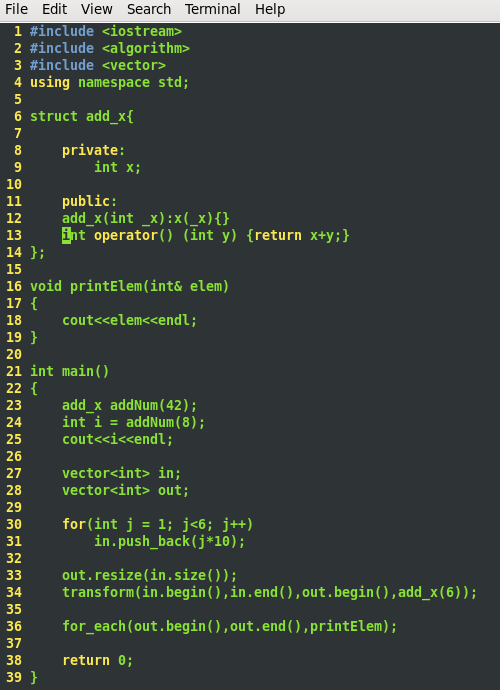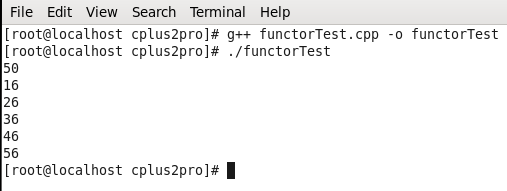仿函数(functor)在类中重载了操作符().
假设类T中重载了操作符(),有T的一个对象t,则通过调用 t(arg) 可实现重载函数的功能。
参考网站:http://stackoverflow.com/questions/356950/c-functors-and-their-uses
A functor is pretty much just a class which defines the operator(). That lets you create objects which "look like" a function:
// this is a functor
struct add_x {
add_x(int x) : x(x) {}
int operator()(int y) const { return x + y; }
private:
int x;
};
// Now you can use it like this:
add_x add42(42); // create an instance of the functor class
int i = add42(8); // and "call" it
assert(i == 50); // and it added 42 to its argument
std::vector<int> in; // assume this contains a bunch of values)
std::vector<int> out(in.size());
// Pass a functor to std::transform, which calls the functor on every element
// in the input sequence, and stores the result to the output sequence
std::transform(in.begin(), in.end(), out.begin(), add_x(1));
assert(out[i] == in[i] + 1); // for all iThere are a couple of nice things about functors. One is that unlike regular functions, they can contain state. The above example creates a function which adds 42 to whatever you give it. But that value 42 is not hardcoded, it was specified as a constructor argument when we created our functor instance. I could create another adder, which added 27, just by calling the constructor with a different value. This makes them nicely customizable.
As the last lines show, you often pass functors as arguments to other functions such as std::transform or the other standard library algorithms. You could do the same with a regular function pointer except, as I said above, functors can be "customized" because they contain state, making them more flexible (If I wanted to use a function pointer, I'd have to write a function which added exactly 1 to its argument. The functor is general, and adds whatever you initialized it with), and they are also potentially more efficient. In the above example, the compiler knows exactly which function std::transform should call. It should call add_x::operator(). That means it can inline that function call. And that makes it just as efficient as if I had manually called the function on each value of the vector.
If I had passed a function pointer instead, the compiler couldn't immediately see which function it points to, so unless it performs some fairly complex global optimizations, it'd have to dereference the pointer at runtime, and then make the call.
自己写了代码,源程序及运行效果如下:
运行结果:
CSDN上有篇博客,写的很不错:http://blog.csdn.net/tianshuai1111/article/details/7687983,也可以参考下。
























 5354
5354

 被折叠的 条评论
为什么被折叠?
被折叠的 条评论
为什么被折叠?








